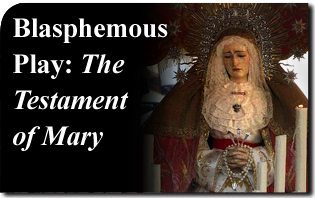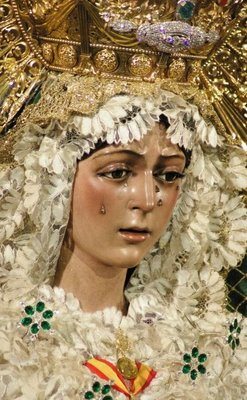 A narrow-minded, vulgar, egoistic and even idolatrous woman — this is how Irish author Colm Tóibín presents the Blessed Virgin Mary in his novel (now making its debut on the stage) titled The Testament of Mary.
A narrow-minded, vulgar, egoistic and even idolatrous woman — this is how Irish author Colm Tóibín presents the Blessed Virgin Mary in his novel (now making its debut on the stage) titled The Testament of Mary.
1 His blasphemous play is being presented at the Walter Kerr Theatre, a Broadway theater, starting Tuesday, March 26, 2013, at 8:00pm.The Testament of Mary is the latest in a wave of blasphemies that has been building for years. It is noteworthy that besides being written by an avowed homosexual, at the Walter Kerr Theatre The Testament of Mary is being performed and directed by open lesbians, namely, Irish actress Fiona Shaw and Deborah Warner.2
Distorting the Image of Mary
Although a former Catholic seminarian, the Irish writer gives free rein to his imagination when expressing his contempt for the Gospels, Christian tradition, and Mary Most Holy.
His truth-twisting goal seems to be well summarized on the book’s flap: “Tobin’s tour de force of imagination…our image of Mary will be forever transformed.”3
The play is a monologue in which the actress recites a so-called “testament of Mary,” and, while using “soft” language, voices the wildest aberrations against the Catholic Faith.
With an interior act of reparation, we present below some examples of these aberrations so that our readers can gauge how far impiety can go.
Contrary to what Christian tradition affirms, Tóibín suggests that Mary was not taken care of in a filial manner by Saint John the Evangelist in Ephesus, but instead was “kept” there by two extortionists who pressured her to provide false testimony they could use to compose the Gospels. Among other things, they urged her to affirm the divinity of Jesus Christ, but she refused, since “She does not agree that her son is the Son of God.”4
Mary is portrayed as a skeptic who did not follow her own Son: “I am not one of his followers.”5 And, she deemed His disciples, “a group of misfits.” Not one of them “was normal.”6
For Tóibín, the Mother of God was secretly a pagan worshiper of the hunting goddess Artemis (the Greek equivalent of the Roman goddess Diana): “I bought from one of the silversmiths a small statue of the goddess who lifted my spirits.”7
The Redemption “Was not Worth It”
At the wedding of Cana, the Irish writer would have us believe that she did not ask her Son to perform a miracle, and that she did not believe in the marvelous transformation of water into wine. While everyone else rejoiced at the miracle, “I did not cheer.”8

At the hour of Crucifixion — Tóibín continues — she fled: “It was my own safety I thought of, it was to protect myself.”9 She did not cradle her Son in her arms when He was lowered from the Cross, nor did she ascertain how He was buried.10
When the disciples say that the Gospels will change the world, this counterfeit Mary disdainfully quips: “‘The world?’ I asked. ‘All of it?’”11
In face of the affirmation that her Son “was the Son of God” and that “he was sent by his father to redeem the world,” Tóibín’s Mary “rage[s] against them,” stating: “I will say that it was not worth it. It was not worth it.”12
Rejecting Christ, Worshipping a Goddess
The novel ends with the Blessed Virgin idolatrously invoking the pagan goddess Artemis: “I speak to her in whispers, the great goddess Artemis… I tell her how much I long now to sleep in the dry earth, to go to dust peacefully with my eyes shut in a place near here where there are trees.”13
The Mother of Our Lord Jesus Christ, a pagan! Evidently, in its perversity, blasphemy respects no limits. No Catholic can remain indifferent to such offenses.
An Injustice Against Benefactors
One of the most shocking acts a person can do is to challenge, ridicule or slander his own father or mother. For the most elementary justice commands us to honor and manifest gratitude and respect for those who gave us life, supported and guided us when we were weak and defenseless.
To act in the opposite manner is to show a hardening of heart and a spirit of revolt that subverts the nature of feelings and the order of things. In short, it is a sin, a grievous sin.
Filial piety is inscribed in human nature by natural law and is a duty sanctioned by Divine Law in the Fourth Commandment.
This is why even those who are prone to excuse other people’s faults are indignant at moral or physical violence perpetrated against parents. From ancient times, parricides and matricides received especially harsh punishment.
Gravity of the Sin of Blasphemy
Now then, if to dishonor one’s natural parents is so serious and gravely unjust, what to say of those who turn against the Creator Himself, to whom they owe their existence even more than to their parents?
If every sin shows contempt for God’s law (a contempt that is more or less pronounced depending on the seriousness of the matter and the person’s intent), when it comes to blasphemy contempt is displayed not against the law, but against God Himself. It is displayed directly, when one vilifies His Holy Name or actions. It is displayed indirectly, when it targets His saints, religion, and sacred things.
Blasphemy is considered the gravest of sins because it directly counters man’s very end, which is to love God.14

Gravity of Blaspheming Our Lady
Our Lady is called our mother in the Litany of Loreto, for she is the Universal Mediatrix with her Divine Son. A second reason is because she is the Mother of the Redeemer, Who gave us the life of grace.
Therefore, the offense to our Mother in the supernatural order is especially grave and iniquitous, and the Most Holy Trinity is particularly offended when she is blasphemed.
Heretical Blasphemy
The gravity of the sin of blasphemy is greater when it expresses heresy, by denying the truths revealed by God and taught by the Magisterium of the Church.
In denying the divinity of Christ, His Resurrection, and the veracity of the Gospels, The Testament of Mary is not only blasphemous but heretical. It presents a caricature of the Blessed Virgin Mary and implicitly denies all of the dogmas the Church has defined in her regard.
In light of the above, The Testament of Mary deserves the most vehement and indignant repudiation from the faithful and The American Society for the Defense of Tradition, Family, and Property—TFP and its America Needs Fatima campaign enjoin their fellow Catholics and all God-fearing Americans to reject it — legally and peacefully — offering their prayers and heartfelt public reparation for the offense it gives to Almighty God, Mary Most Holy, and the Catholic Church.
Footnotes
- Colm Tóibín, The Testament of Mary (New York: Scribner, 2012). All of the quotes in this article are from this edition of the novel.
- Cf. Susanna Rustin, “A life in books: Colm Tóibín,” The Guardian, Oct. 25, 2010, http://www.guardian.co.uk/books/2010/oct/25/colm-toibin-brooklyn-family-interview, accessed Mar. 20, 2013; John Preston, “Costa Book Awards: Colm Toibin interview,” The Telegraph, Jan. 25, 2010, http://www.telegraph.co.uk/culture/books/books-life/7074090/Costa-Book-Awards-Colm-Toibin-interview.html, accessed Mar. 20, 2013; Tim Teeman, “Fiona Shaw: ‘I Have Enormous Sadness in Me,’” The Times, Dec. 10, 2009, http://www.consortentertainment.com/news-details.aspx?newsID=21295 accessed Mar. 20, 2013; Liz Hoggard, “Power lesbians: The female celebs who are out and proud,” Evening Standard, Aug. 24, 2009, http://www.standard.co.uk/lifestyle/power-lesbians-the-female-celebs-who-are-out-and-proud-6717981.html, accessed Mar. 20, 2013; “The IoS Pink List 2010,” The Independent, Aug. 1, 2010, http://www.independent.co.uk/news/people/news/the-iiosi-pink-list-2010-2040472.htm, accessed Mar. 20, 2013; Fiona Shaw, “What’s harder than telling your parents that you’re gay? Telling your children.” The Independent, Apr. 24, 2012, http://www.independent.co.uk/life-style/health-and-families/features/whats-harder-than-telling-your-parents-that-youre-gay-telling-your-children-7670484.html, accessed Mar. 20, 2013.
- Tóibín, book flap.
- Ibid.
- Ibid., 44.
- Ibid., 6.
- Ibid., 10.
- Ibid., 38.
- Ibid., 65.
- Cf. Ibid., 79.
- Ibid., 77.
- Ibid., 80.
- Ibid.
- Thomas Aquinas, Summa Theologica, II-II, qq. 13-14.

